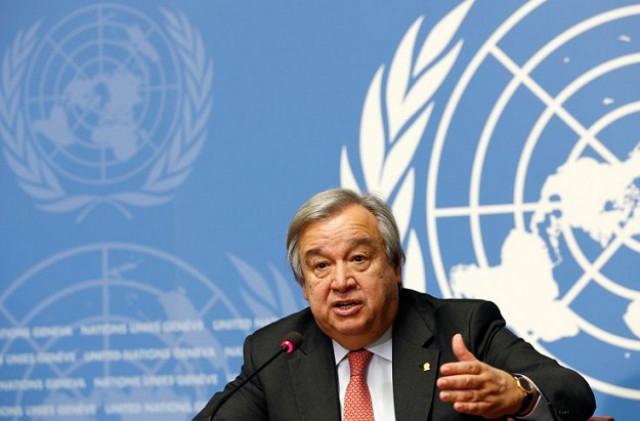Step back from the brink, UN urges Pakistan, India
Guterres offers good offices to mediate Warns tensions could spark military clash

UN Secretary-General Antonio Guterres on Monday urged Pakistan and India to "step back from the brink", warning that the deteriorating situation following a recent terror attack in Indian Illegally Occupied Jammu and Kashmir (IIOJK) could spiral into a military confrontation.
Speaking to reporters outside the UN Security Council (UNSC), Guterres expressed deep concern over the state of relations between the two South Asian neighbours, saying tensions were "at their highest in years", according to the UN website.
Tensions have surged following the April 22 attack in IIOJK's Pahalgam town, which left 26 people dead. India blamed Pakistan without providing any evidence, while Islamabad categorically rejected the allegation and called for a transparent, impartial investigation.
The situation worsened when Indian Prime Minister Narendra Modi gave his military leadership "operational freedom" to respond to the attack "as they see fit". Pakistan warned of a 'swift' retaliation to any aggression from New Delhi.
At his media talk, Guterres reiterated his condemnation of the April 22 Pahalgam attack, saying that targeting civilians was unacceptable. "Those responsible must be brought to justice through credible and lawful means," the secretary-general stated.
UN ready to help
"It is also essential – especially at this critical hour – to avoid a military confrontation that could easily spin out of control," he warned. "Now is the time for maximum restraint and stepping back from the brink," he said, stressing that "a military solution is no solution".
The UN chief offered his good offices to both governments to help defuse tensions and promote diplomacy. "The United Nations stands ready to support any initiative that promotes de-escalation, diplomacy, and a renewed commitment to peace," he said.
The secretary-general praised both countries for their long-standing contributions to UN peacekeeping operations and expressed hope that their shared history of cooperation could form the basis for renewed dialogue.
Meanwhile, Pakistan welcomed the secretary-general's call for de-escalation in a telephone call from Guterres to Prime Minister Shehbaz Sharif. In his second call within a week, Guterres and Shehbaz discussed the prevailing situation in South Asia, the Prime Minister House said in a press release.
The UN secretary general briefed the prime minister on his outreach efforts for peace and stability in the region, and expressed his commitment to remain engaged with all interlocutors on the issue," according to the press release.
The prime minister appreciated the secretary-general's continued efforts, and welcomed his call for de-escalation as well as the need to avoid any confrontation, it said. Shehbaz reiterated his offer of an independent transparent, neutral and credible investigation into the Pahalgam incident.
The prime minister expressed his concern that India without providing any evidence, continued to resort to provocative rhetoric and war mongering. He reiterated Pakistan's determination to defend its sovereignty and territorial integrity.
The prime minister expressed his serious concern at Indian attempts to politicise international financial institutions in an attempt to harm Pakistan's economic interests, according to the Prime Minister House press release.
Since the tensions arose, several international and regional players engaged with Pakistan and India, urging restraint between the two nuclear armed neighbours. There have been hectic diplomatic activities going on to defuse the situation.
On Sunday Foreign Minister Ishaq Dar received a call from his Russia counterpart, Sergey Lavrov. Lavrov emphasised that both sides should exercise restraint and avoid escalation. His call was echoed in a statement from Kremlin Spokesperson Dmitry Peskov, who on Monday urged restraint by both sides.
Peskov said that Moscow highly valued its relations with both New Delhi and "we hope that the parties will be able to take measures... that will reduce tensions." He said that Moscow was "following with great concern" the tense atmosphere at the Pakistan-India border.
Also, Gulf Cooperation Council (GCC), a grouping of oil rich Arab states, issued a statement, calling on Pakistan and India to pursue a diplomatic path to resolve their issues. In the meanwhile, Prime Minister Shehbaz and Foreign Minister Dar spoke with their Malaysian counterparts.
While speaking with Malaysian Prime Minister Anwar Ibrahim, Prime Minister Shehbaz reiterated Pakistan's offer for an international probe to ascertain the facts behind the Pahalgam incident. He said that Pakistan would welcome Malaysia's participation in this investigation.
Dar on Monday spoke with Bangladesh's Foreign Affairs Adviser Touhid Hossain and briefed him on the escalating regional tensions. Hossain expressed concern over the current situation and stressed the importance of exercising restraint by all parties and the need for de-escalation.
(WITH INPUT FROM AGENCIES)





















COMMENTS (1)
Comments are moderated and generally will be posted if they are on-topic and not abusive.
For more information, please see our Comments FAQ